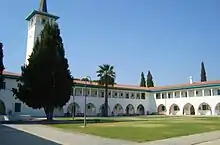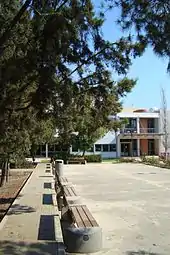University of Cyprus
The University of Cyprus (UCY; Greek: Πανεπιστήμιο Κύπρου; Turkish: Kıbrıs Üniversitesi) is a public research university established in Cyprus in 1989.[1] It admitted its first students in 1992 and has approximately 7000 students.
 | |
| Type | Public |
|---|---|
| Established | 1989 |
Administrative staff | 811 |
| Undergraduates | 7.000 |
| Location | , |
| Campus | Aglantzia |
| Colors | Yellow |
| Affiliations | UNIMED |
| Website | www.ucy.ac.cy |
History
The University of Cyprus was established in 1989 and admitted its first students in 1992.
Admission for the majority of undergraduate students is by entrance examinations organised by the Ministry of Education and Culture of the Republic of Cyprus. A number of places are reserved for students with special needs or circumstances.
When the University of Cyprus opened, the incoming class consisted of 486 undergraduate students. During the academic year 2010–2011, 4691 undergraduate students attended courses offered by the 21 departments. At the same time, there were 1549 postgraduate students.



Academic reputation
| University rankings | |
|---|---|
| Global – Overall | |
| ARWU World[2] | 601–700 (2019) |
Based in the capital of Cyprus, Nicosia, teaching is mainly in Greek. The official languages are Greek and Turkish, but only a few Turkish speakers are registered. Since September 2005, the university credit point system is based on European Credit Transfer and Accumulation System.
Those eligible to participate in the entrance examination for the University of Cyprus are Cypriot citizens or those with at least one parent of Cypriot origin. Prospective students will have graduated from a six-year high school. A number of positions are granted to the handicapped or those with special needs.
Greeks of the Diaspora and Cypriots who belong to specific religious groups as determined by the constitution of Cyprus, repatriated Cypriots and Cypriots who are permanent residents in the other countries, can claim a limited number of posts (3% of the admitted Cypriot students) based on General Certificate of Secondary Education or General Certificate of Education or other equivalent exams. Turkish Cypriots who hold a six-year high-school diploma are eligible for admission upon passing special examinations set by the University.
The programmes of studies at the University of Cyprus are based on credit hours. One credit hour is normally equivalent to one weekly 50-minute «class» per semester. To graduate from the university, a student must successfully complete 120 credit hours as described in the programme of the department, which must include 12–15 credit hours of free elective courses outside the major area of studies and from at least two faculties. In addition to the 120 credit hours, the student must complete the university foreign language requirement of 6 to 9 credits.
According to the Webometrics Ranking of World Universities the University of Cyprus ranks 304th in Europe and 696th in the world.[3]
| Global rankings | |
|---|---|
| QS (2021)[4] | 151–200 (education) |
| THE (2021)[5] | 351–400 |
Faculties

There are eight faculties:
- Faculty of Humanities: three departments and the Language Centre
- Faculty of Pure and Applied Sciences: five departments and the Oceanography Centre,
- Faculty of Social Sciences and Education: four departments and the Centre for Gender Studies
- Faculty of Economics and Management: two departments, the Economic Research Centre and the Centre for Banking and Financial Research
- Faculty of Engineering: four departments, the Nanotechnology Research Centre, the KIOS Research and Innovation Center of Excellence and the NIREAS International Water Research Centre.
- Faculty of Letters: three departments and the Archaeological Research Unit
- Faculty of Graduate Studies
- The Medicine School
Library
The library offers access to more than 700,000 print and electronic book titles, tens of thousands of online and print journal titles, and 160 scientific databases. It also includes audiovisual and digitized material. The library will move to the new university campus, in the new "Stelios Ioannou Learning Resource Center", designed by the French architect Jean Nouvel, in 2017.
Research

There are currently more than 200 ongoing research programs,in collaboration with other academic, private and governmental authorities. A list of the current research programs can be found here Additionally, more than 550 programs were completed in the period 2012-2019. The list of the completed programs can be seen here.
Few notable research activities are the following:
- The university announced in 2012 a 10 MW photovoltaic park.
- The university will lead a €1.3 million investigation into the adoption of net metering.
- UoC will lead an EU-funded European research module on compelling net metering policies.
- Institutions from five countries will join UoC on a project: Aristotle University, Greece; University of Maribor, Slovenia; Andalusian Energy Institute, Spain; Agency for Energy and Environment in Rhone Alpes, France; and the Agency for Energy and Environment in Algarve, Portugal.[6][7][8]
Notable alumni
- Anna Prodromou, Greek Cypriot communication consultant, journalist, speaker and educator
- Anna Theologou, Greek Cypriot economist and politician
- Demetrios Nicolaides, Canadian politician
- Doğuş Derya, Turkish Cypriot activist and politician
- Maria Elena Kyriakou, Greek Cypriot singer
- Neşe Yaşın, Turkish Cypriot poet and author
- Yvonne Jegede, Nigerian actress, film producer, model, and television personality
References
- "University of Cyprus, Nicosia, Cyprus - Listing by Bizpages". bizpages.org. Retrieved 1 May 2020.
- Academic Ranking of World Universities 2019
- Webometrics: Ranking Web of Universities
- "QS World University Rankings 2021". Quacquarelli Symonds Ltd.
- "World University Rankings 2021". Times Higher Education.
- Cyprus Today: University of Cyprus will lead EU Net Metering research Archived 24 June 2013 at Archive.today
- Kick off meeting of the PV‐NET project "Promotion of PV energy through net metering optimization"
- "Net Metering: A Global Study of Existing Net-‐Metering Practices for Renewable Energy Sources". Archived from the original on 27 May 2012. Retrieved 20 June 2013.
External links
| Wikimedia Commons has media related to University of Cyprus. |